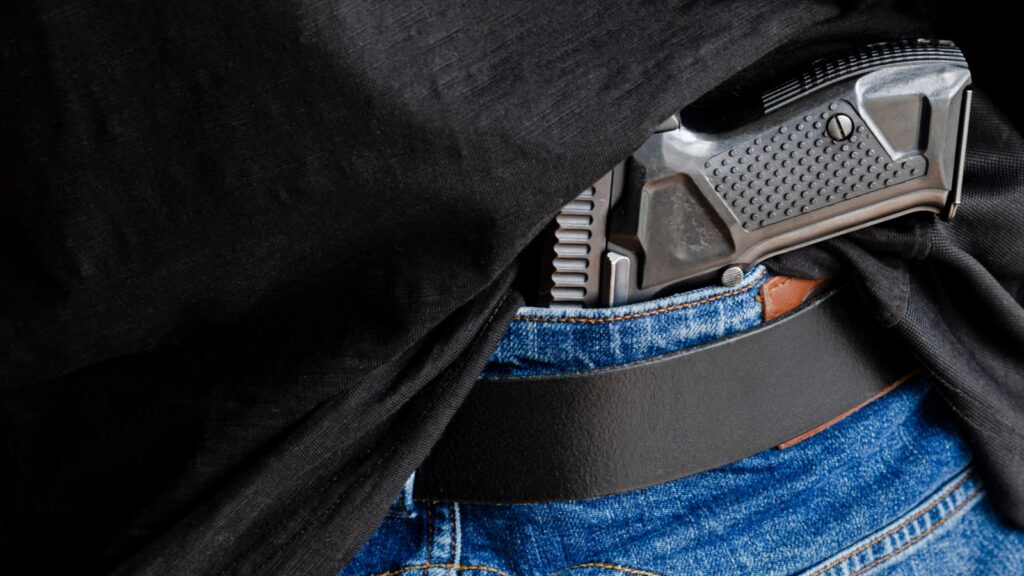Missouri is known for its strong Second Amendment protections, but when it comes to open and concealed carry, the laws can be confusing. While the state allows permitless concealed carry, there are still restrictions that gun owners must follow to stay within the law. Understanding where, when, and how you can legally carry a firearm is crucial—otherwise, you could find yourself facing serious legal trouble.
No matter if open or concealed carry, any firearms charge is a serious offense. If you or someone you know is facing a weapons charge, it’s important to have a free, confidential consultation with an expert gun charges lawyer based in St. Louis. Call Combs Waterkotte immediately at (314) 900-HELP or reach out online. Our gun charges legal team has over 40 years of experience and has successfully handled more than 10,000 cases just like yours. Here, we’ll break down Missouri’s gun laws.
What are the Open Carry Laws in Missouri?
In Missouri, you can openly carry a firearm anywhere they are not prohibited. Municipalities are able to prohibit open carry in certain areas, as are private businesses, and it is also typically not allowed on church premises, near polling stations, and on federal property.
You are able to carry firearms in your vehicle without notifying an officer, you can carry in state parks, and in restaurants that serve alcohol (but not by the bar). If you want to openly carry a weapon in a public area or built-up space, check with the local laws to ensure you stay on the right side of the law.
The open carry laws in Missouri have raised some debate amongst gun owners, many of whom have pointed out that open carry puts you at a strategic disadvantage in a serious situation, and it requires all other firearm owners to assess your intentions.
What are the Concealed Carry Laws in Missouri?
According to Missouri Revised Statute § 571.101, a concealed carry permit (CCW) is available to anyone:
- At least 19 years old
- Who is a U.S. citizen or permanent resident
- Who has Missouri residency
- Who has not been convicted of a felony
- Who is not a fugitive from justice
- Who has not been discharged from the U.S. armed forces under dishonorable discharge conditions
- Who has completed an 8-hour firearms safety course taught by a state-approved instructor
There are certain locations where concealed carry is restricted, and you will need a CCW permit in those areas. Also, you are not permitted to carry a concealed firearm on any school facility (unless you have explicit consent of the governing body), any child-care facility, any law enforcement facilities, federal buildings or land, amusement parks, religious organizations, private property where the owner has prohibited concealed carry, and more. Learn more about Missouri gun laws.
Common Gun Charges in Missouri
Unlawful Possession of a Firearm: If you have already been convicted of a felony, there are no circumstances in which you can lawfully own a gun. You can also not possess a gun if you are wanted for a crime elsewhere, are intoxicated or drugged, or judged to be mentally incompetent.
Unlawful possession of a gun is a class C felony. This does not apply to an antique firearm. A class C felony has a maximum penalty of a prison term of ten years in prison (with no less than three years).
Unlawful Use of a Weapon: Unlawful use of a weapon in regard to gun laws, includes:
- Setting a spring gun
- Firing a gun into a vehicle, boat, aircraft, home, or any other structure where people gather
- Angrily or threateningly exhibiting a weapon in the presence of other people
- Firing a gun within 100 yards of a school, church, or courthouse, across or along a public highway
Punishment for unlawful use of a weapon is a class D felony in most cases, though there are exceptions. A class D felony has a punishment of up to 7 years in prison and a fine of up to $5,000.
If you discharge a weapon at a vehicle it is a class B felony, which is punishable by a maximum of 15 years in prison (no less than 5 years).
Defacing a Firearm: It’s a crime to knowingly deface a gun in Missouri, so this includes removing any identifying marks by the manufacturer or importer. Defacing a gun in this way is a class A misdemeanor, which is punishable by a maximum of one year in jail and a fine of no more than $2,000.
Fraudulent Purchase of a Firearm: Fraudulent purchase occurs when someone entices, persuades, encourages, or solicits someone to sell a firearm or ammunition to them when they are in full knowledge that the transaction is illegal. This also covers falsifying your information in order to purchase a firearm or ammunition.
Fraudulently purchasing a firearm is a class E felony. A class E felony is punishable by a prison term of up to 4 years.
Unlawful Manufacture, Transport, Repair, or Sale of Certain Weapons: if you knowingly possess, manufacture, transport, repair, or sell an explosive weapon, a gas gun, bullets and projectiles that explode or detonate on impact, a machine gun, sawn-off shotguns and rifles, and silencers.
These crimes are a class C felony, penalties of which are a prison term of up to 10 years and a fine of up to $5,000.
Terrorist Threat: A terrorist threat 1st degree is a class D felony, while 2nd degree is class E.
If you’re facing any of the above charges, call Combs Waterkotte now at (314) 900-HELP or contact us online. Our skilled and aggressive gun charges lawyers can discuss the specifics of your case and start working on your defense strategy to get the best possible outcome.
Springfield, MO in 2019
On August 8, 2019, 20-year-old Dmitriy Andreychenko was arrested on suspicion of first-degree making a terrorist threat and was charged the next day with making a terrorist threat in the second-degree, which is punishable with up to 4 years in prison and is a class E felony.
Andreychenko walked into the Springfield Walmart with multiple weapons, including an AR15 and 100 rounds in ammunition, wearing military fatigues and a bulletproof vest. Although he never fired the gun, his presence and actions in the store caused shoppers to panic, flee, and called the police about an active shooter. The store manager made the decision to pull the fire alarm and evacuate the store.
Andreychenko was seen pushing a shopping cart and filming a video with his cellphone. Andreychenko tried to leave the premises prior to the arrival of the police but was detained at gunpoint by an off-duty firefighter. His actions came just days after two deadly shootings; one at an El Paso Walmart in which 22 people were killed, and another in Dayton, Ohio where a further 9 people died, including the shooter’s own sister.
“His intent was not to cause peace or comfort,” Lieutenant Mike Lucas told KYTV of the Missouri suspect. “He’s lucky he’s alive still, to be honest.” Had the off-duty firefighter not detained him, he may have come up against another person with a firearm who was less willing to give him the benefit of waiting for law enforcement to arrive and take control of the situation. Police praised the firefighter’s quick actions.
While private businesses are well within their right to prohibit open carry in their stores and on their premises, Walmart is not one of them.
Was it a good idea to walk into the Walmart in a bulletproof vest and a rifle? No. While what he did wasn’t technically illegal in Missouri, or in Walmart, doing so can easily be construed as threatening behavior – and even more so after the events of the previous day.
Has This Happened Before?
Arrests and convictions even where open carry is legal is not unusual after a mass shooting event. In April 2013, an Iraq and Afghanistan war veteran attending a pride event in Colorado Springs on the day after the Aurora theater shooting was arrested for openly carrying his handgun (though unlike Andreychenko, his gun was holstered to his belt). Apparently, the officers involved were unaware that it was perfectly legal to openly carry a weapon in a city park in Colorado. He later filed a lawsuit because his rights were violated and won $23,000 against the city.
In 2016, a man legally carrying a gun in Dallas during the police protests was mistakenly arrested while peacefully protesting.
Similarly, in Toledo, Ohio in 2015, Shawn Northrup went out for a walk with his wife, daughter, grandson, and dog with his cellphone and a semiautomatic handgun holstered to his belt. A passing motorist took umbrage with his open display and yelled, “you can’t walk around with a gun like that!” and after a heated exchanged, he called the police. Northrup was detained for 90 minutes but his charges were eventually dropped.
The fact is that it’s completely legal to openly carry or carry a concealed weapon in most locations in Missouri, so if you are charged or under investigation for a gun law violation in the St. Louis Metro area, it’s vital you talk to an experienced gun law attorney as soon as possible. Contact us today or call (314) 900-HELP to arrange a free case review and ensure you get the very best outcome possible and protect your rights.







